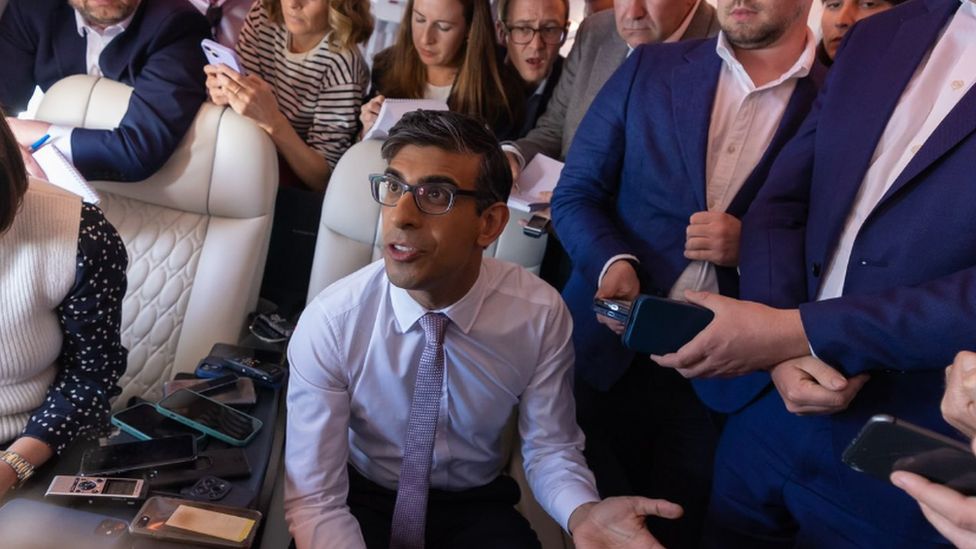ARTICLE AD BOX
 Image source, Rishi Sunak
Image source, Rishi Sunak
Rishi Sunak spoke to reporters on the plane trip to Washington DC
By Joshua Nevett & Paul Seddon
BBC Politics
Prime Minister Rishi Sunak has said he expects to discuss Joe Biden's flagship package of investment in green industries when he meets the president during his trip to the United States.
On the plane to Washington DC, Mr Sunak said "subsidy races" were not a solution to hitting climate goals.
Some British ministers have criticised Mr Biden's Inflation Reduction Act (IRA) as harmful to world trade.
The law includes $370bn (£297bn) to boost green technology in the US.
In a drive to cut carbon emissions, billions in tax credits and subsidies has been allocated to speed up the production of solar panels and wind turbines, and encourage the up-take of electric cars.
The European Union has described the law as anti-competitive, while earlier this year, Energy Secretary Grant Shapps said the package was "dangerous because it could slip into protectionism".
It is expected to be one subject of discussion when Mr Sunak meets Mr Biden for the fourth time this year, for talks at the White House on Thursday, following meetings with business leaders and senior politicians.
The prime minister's spokesman suggested Mr Sunak would also talk about boosting green tech, the war in Ukraine, and the regulation of artificial intelligence.
Downing Street said the prime minister would seek to boost economic security, bringing it into line with the level of UK-US co-operation on defence.
Tensions over the global implications of Mr Biden's economic package have been building ahead of the visit, Mr Sunak's first official trip to Washington DC as prime minister.
The UK government has said it had no plans to emulate the scale of the US plans, prompting accusations from Labour that the UK could fall behind in a global race to attract future industries.
During his flight to Washington, reporters asked Mr Sunak if there was anything Mr Biden could do to ease the economic impacts of his package on the UK.
"It's something that he [President Biden] and I have discussed in the past and you'd expect us to continue discussing it," Mr Sunak said.
When asked whether Mr Sunak accepted President Biden's argument that a resilient economy sometimes required a protectionist approach to key sectors, the prime minister referenced a joint statement issued by the G7 at the end of its latest summit in Japan.
The statement, he said, "makes it very clear that G7 countries don't believe in protectionism as the answer to this challenge and also don't believe in in subsidy races that are zero sum".
There have been reports his trip could see the two sides unveil a critical minerals pact that would allow British carmakers that export electric vehicles to the US to benefit from some of the tax credits offered to American firms.
The US signed such a deal with Japan earlier this year, and has entered into talks with the EU.
However, one area where progress has stalled is over a wider UK-US free trade deal, where President Biden has put talks on ice, leaving the UK to deepen trade ties through less comprehensive mini-deals with around 20 states.
AI regulation
Another area where Mr Sunak hopes to hold discussions is the regulation of artificial intelligence (AI), where Mr Sunak is seeking to carve out a role for the UK as a global player.
The prime minister is hosting a global summit on AI regulation in the autumn, and has reportedly expressed an interest in the UK hosting any new international regulator for the emerging technology.
However, the extent to which the UK will be able to shape new global rules outside the EU is unclear, with the UK now shut out of key gatherings between European and American regulators such as the Tech and Trade Council (TTC).
The two leaders will also discuss the war in Ukraine, which is expected to enter a decisive period soon, with signs a long-awaited counter-offensive from Ukrainian forces may have begun.
It comes after Ukraine blamed Russia for the collapse of the Kakhovka dam in Russian-held Ukraine, prompting the evacuation of thousands of people. Moscow has denied destroying the dam, instead blaming Ukrainian shelling.
Speaking to reporters on the plane to the US, Mr Sunak said it was "too soon" to make a "definitive judgement" on whether Russia was behind the attack.
But he said if Russia were found to be responsible, it would "demonstrate the new lows that we will have seen from Russian aggression."

 1 year ago
23
1 year ago
23








 English (US) ·
English (US) ·